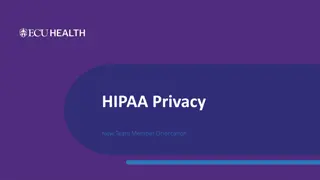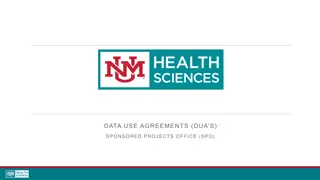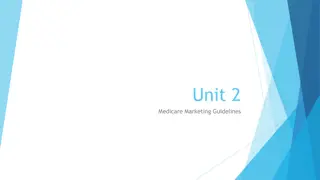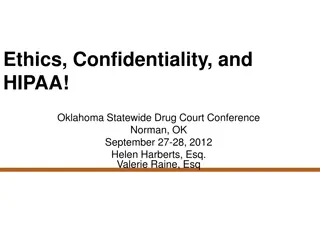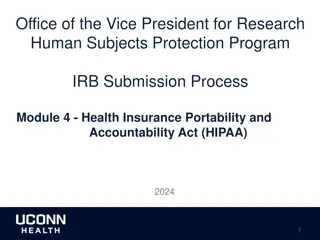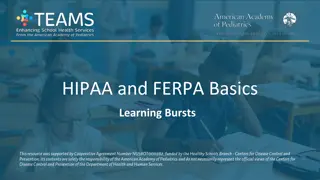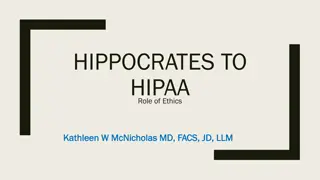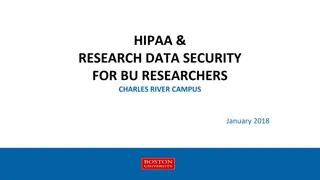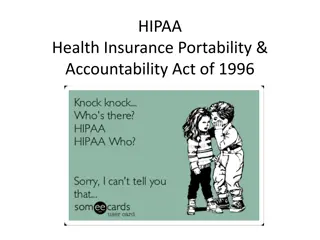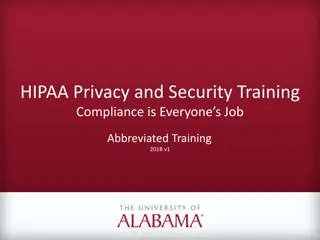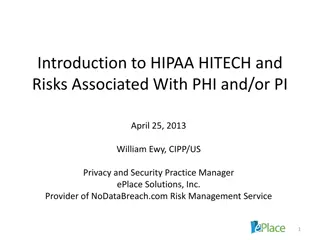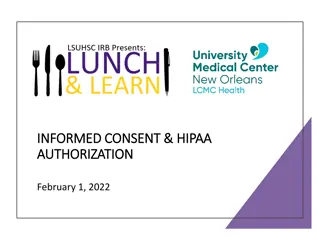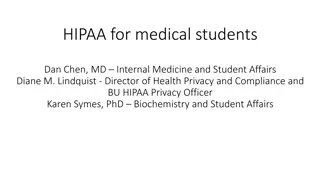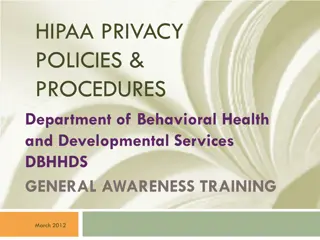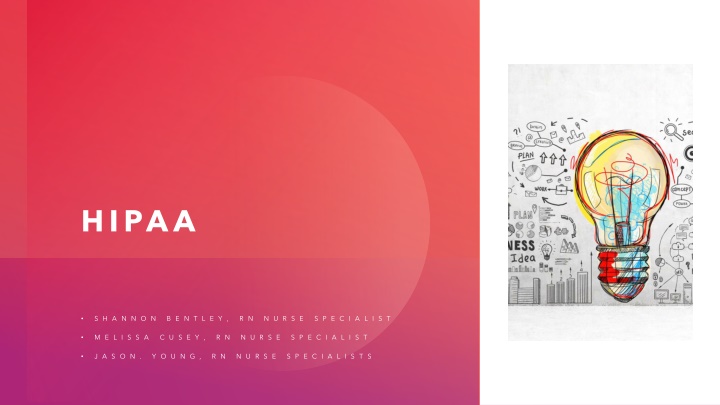
HIPAA and Privacy Rules in Healthcare
Explore the significance of HIPAA, confidentiality, and privacy rules in healthcare, including the protection of personally identifiable information (PII) and the importance of maintaining privacy in the sharing of patient health information. Learn about the need-to-know basis in handling sensitive data and how to ensure compliance with privacy regulations.
Download Presentation

Please find below an Image/Link to download the presentation.
The content on the website is provided AS IS for your information and personal use only. It may not be sold, licensed, or shared on other websites without obtaining consent from the author. If you encounter any issues during the download, it is possible that the publisher has removed the file from their server.
You are allowed to download the files provided on this website for personal or commercial use, subject to the condition that they are used lawfully. All files are the property of their respective owners.
The content on the website is provided AS IS for your information and personal use only. It may not be sold, licensed, or shared on other websites without obtaining consent from the author.
E N D
Presentation Transcript
HIPAA S H A N N O N B E N T L E Y , R N N U R S E S P E C I A L I S T M E L I S S A C U S E Y , R N N U R S E S P E C I A L I S T J A S O N . Y O U N G , R N N U R S E S P E C I A L I S T S
CONF I D E N TI A L I TY: W HY CA N T I T B E J UST THI S S I MPL E ?
IN 1996 CAME .
PERSONALLY IDENTIFIABLE INFORMATION (PII) PII = information from which a person s identity is apparent, or can reasonably be ascertained Name Phone numbers Date of Birth Medical record numbers Social security number Legal documents Photo/x-ray/video Medical notes Fingerprint/voiceprint Email address Mother s maiden name Educational records Address
P R I V A C Y R U L E
T H E P R I VA C Y R U L E A N D T H E C E N T E R I N F O R M AT I O N S Y S T E M ( C I S ) Protected Health Information (PHI) should not be put into the CIS unless there is a specific reason that every single staff person needs to know that information Accommodations should be put into CIS, but a medical diagnosis reference to the IEP should not be included 6
Keep in mind that the confidentiality of health-related information must be maintained when the information is being transmitted orally. This means that you must be sure that all such discussions take place in private locations where unauthorized persons cannot overhear the conversation, either voluntarily or involuntarily. Adhere to the minimum necessary standard for use and disclosure of student health information.Ask yourself, What if my information was being discussed like this? S H A R I N G P H I W I T H C E N T E R S TA F F HIPAA does not block the communication of information on a need to know basis on center Information must be shared for the safety and security of students or staff and to protect centers from liability 7
NEED TO KNOW Basic considerations: What is our mission? (Employability) What is the expected outcome of having this information? How does having this information meet goal/help student? What does staff need to know to work with the student? 8
H I PA A A N D M E N TA L H E A LT H I N F O R M AT I O N : 4 5 C F R 1 6 4 . 5 0 1 . There are stricter requirements for mental health records than for other medical records. Refer to your CMHC for any questions regarding Mental Health and HIPAA.
PRIVACY RULE: SCENARIO John Doe has prescriptions that need to be refilled. You fax the refills to the MedX Pharmacy. The center driver picks them up and when he returns to center gives them to John Doe and mentions to John he used to take Prozac, too. The student is upset and complains to you. What request can you make to the pharmacy to protect the students PHI. Make sure all staff receive annual HIPAA Training.
N O W T O A D D A N O T H E R W R I N K L E : 4 2 C F R PA R T 2
S TA N D A R D S F O R P R I V A C Y O F I N D I V I D U A L LY I D E N T I F I A B L E H E A LT H I N F O R M AT I O N , F I N A L R U L E 2 0 0 0 Substance Abuse programs that are subject to HIPAA must comply with the privacy rule as well. Job Corps is such a program. (See 42 CFR 2.11 Program definition: An individual or entity (other than a general medical care facility) who holds itself out as providing and provides, alcohol or drug abuse diagnosis, treatment or referral for treatment). The general rules established by Part 2 and the Privacy Rule regarding uses and disclosures of patient health information are very different. Substance abuse treatment programs must comply with both rules.
W H AT A R E A L LO W A B L E D I S C LO S U R E S B A S E D O N 4 2 C F R PA R T 2 ? Written authorization/Consent (minors need to sign as well as guardian) *know state law Internal communications** Crime on program premises/against staff To law enforcement, limited to circumstances/incident; patient status; name/address/last known whereabouts Medical Emergency Only to medical personnel and limited to necessary to address emergency MUST account for disclosure (to whom; affiliation; by whom; time/date; nature of emergency)
TEAP-RELATED SCENARIOS -
SCENARIO 1- The TEAP specialist emails the weekend restricted list to staff which includes those students awaiting a 45-day follow-up screen. This list is available to a large contingent of the dormitory staff. The list is designed to restrict students from spending the night off center during their 45-day intervention period. What are the concerns with this practice?
INFORMATION SHARED WITH CSIO: SCENARIO 2 A student fails their second drug screen and will be a ZT termination. The CSIO has asked that copies of the CDD results be provided for the file. What are the concerns? Suggestions on how to handle?
The TEAP Specialist notifies the guardian of all positive drug results and the CMHC provides treatment information to the guardian of a 17 year old. Should the staff be doing this? N O T I F I C A T I O N : S C E N A R I O 3
A D D I T I O N A L S C E N A R I O S
O R A L T R A N S M I S S I O N : S C E N A R I O Shawn, a Job Corps student, is waiting in line in the cafeteria. He overhears two staff members (center nurse & counselor) talking about placing a student named Mike on medical leave for a doctor s appointment, medical tests, and a refill on medication. The next day Mike comes to your office and asks how everyone knows about his doctor s appointment and his leave to go home. Is this an appropriate place for the nurse and counselor to discuss a student leave? Who should the student be referred to hear his complaint? 19
HEALTH & WELLNESS WBL SCENARIO Roger is assigned to work in wellness emptying the trash and mopping the floors. He is a hard worker and is happy to assist in doing extra duties. Your office door is left open and the SHRs for the new students who are arrived on Tuesday are on your desk. When you get back to your office you see Roger emptying the trash which is under your desk. Susie is a CNA student has come into change the linens on the infirmary beds. Susie is outside your office talking to Roger. Are these situations acceptable?
I N S T R U C TO R S C E N A R I O Ms Wyatt, an academics instructor comes to the staff nurse and asks what Mary s diagnosis is. She reports that Mary is very sleepy and seems unfocused at times. She relates Mary has been this way for a few days What can you tell Ms Wyatt? Can you share Mary s diagnosis with Ms Wyatt?
HIPAA AUTHORIZATION: SCENARIO Sara Jones is a newly-diagnosed insulin dependent diabetic. You share this information with the Food Services Manager and staff. It has been noticed by staff that Sara eats candy, chips, and cookies most of the time. Can Sara s health status be shared without her written permission?
H I P A A S U P P L E M E N T A L A U T H O R I Z A T I O N AUTHORIZATION FOR USE AND DISCLOSURE OF YOUR HEALTH INFORMATION We, __________________________________, are prohibited from sharing your (Name of entity) personal health information (except as indicated in a Notice you have received or will receive), unless you authorize us to share this information with others. We are asking you to allow us to use or share certain health information about you, as described below. You do not have to sign this Authorization if you do not want to. We will not condition treatment on whether you sign this Authorization (unless you are receiving treatment because you are participating in a research study, or unless the purpose of the treatment is to obtain information specifically for the purpose of sharing it with a third party, such as your family doctor). If you do sign this Authorization, you have the right to change your mind and revoke this Authorization, unless we have relied on this Authorization already. You may revoke this Authorization by submitting your revocation in writing to_____________________________________________________________________. (Name and title) We will share only the information needed to accomplish the purposes described below. It is possible that the person or people with whom we share your information under this Authorization might share the information with someone else. If that happens, it is possible that the information might no longer be protected by medical privacy rules. In certain circumstances, other federal, state, or local law may prevent us from sharing information about you, even though you have authorized us to share this information. In those circumstances, we will not share health information about you. The information we will use or share is as follows: ________________________________________________________________________ ________________________________________________________________________________________________________________________________________________ (Description of information to be used or disclosed - must identify the information in a specific and meaningful fashion.) The people who will give out the health information are the following: ________________________________________________________________________ (Name or other specific identification of the person(s), or class of persons, authorized to make the requested use or disclosure.) We may share the health information described with the following people: ________________________________________________________________________ (Name or other specific identification of the person(s) or class of persons to whom the covered entity may make the requested use or disclosure.)
OTHER CONSENTS AND AUTHORIZATIONS Should you have students sign blank release of Authorization or Supplemental HIPAA Authorization and have them in the SHR for you to complete as needed? True or False
CONFIDENTIALITY OF STUDENT RECORDS PRH 6.4, R20: Confidentiality and safeguarding student records is your responsibility Be aware of state, federal, and local laws Refer to Appendix 601 (Student Rights to Privacy and Disclosure of Information) and Appendix 202 (Transmission, Storage, and Confidentiality of Medical, Health, and Disability-Related Information)
ACCESS TO STUDENT RECORDS PRH 6.4, R21 Centers and OA/CTS providers shall respond to requests from former students or third parties for information concerning their enrollments, must have: A written, signed release of information and Be in accordance with provisions of Appendix 601
Access to Student Records: When the center has custody of the record, designated center staff shall respond to requests from former students or third parties, for information concerning their enrollments, only upon receipt of a written signed release of information, and in accordance with the provisions of this appendix, the Notice, and the Authorization. RELEASE OF INFORMATION: APPENDIX 202
SUBPOENAS PRH 6.4, R22: Centers and OA/CTS contractors shall forward all subpoenas to produce a student record or to testify regarding a student record to the Regional Office. FOR STUDENT RECORDS
DISCLOSURE LOG The Privacy Rule requires that you document, on a Disclosure Log, certain kinds of disclosures. The log must be retained for 6 years.
NAME OF PERSON(S) OR ENTITY RECEIVING PHI BRIEF LOCATION OF HARD COPY OF DISCLOSURE NAME OF STUDENT DESCRIPTION OF PHI DISCLOSED PURPOSE OF DISCLOSURE DATE D I S C L O S U R E L O G
PRH RESOURCES Appendix 601: STUDENT RIGHTS TO PRIVACY AND DISCLOSURE OF INFORMATION Appendix 202: TRANSMISSION, STORAGE, AND CONFIDENTIALITY OF MEDICAL, HEALTH, AND DISABILITY-RELATED INFORMATION HIPAA Authorization PRH Form 6-02 HIPAA Notice PRH Form 2-01 Job Corps Program Instruction 06-23 Guidance on Safekeeping of Forms, Records, and Other Hardcopy Documents Containing PII https://supportservices.jobcorps.gov/health/Pages/HIPAA.aspx Job Corps PRH Instruction Notice IN 17-03 Strategies to Ensure the Protection of Health-Related Personally Identifiable Information Release Date: August 3, 2017


